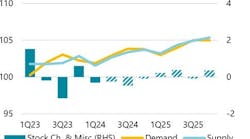Eric Watkins
OGJ Oil Diplomacy Editor
LOS ANGELES, Mar. 7 -- Oil prices climbed to their highest point in nearly 30 months today as Libyan warplanes launched multiple airstrikes on opposition fighters at Ras Lanuf, a major oil hub on the Mediterranean coast, about 660 km east of Tripoli.
“It is essentially the fear of the unrest spreading across the entire region which is pushing oil prices up,” said Frankfurt-based Commerzbank, noting that “Northern Africa and the Middle East produce more than one third of the global supply of crude oil.”
However, while noting the impact of supply disruptions, Commerzbank said speculators also are playing a role in the rising price of oil—now driving them to a critical point.
“Things become critical, though, when speculators become the main driving force behind prices and, as we see it, this is the case at the moment on the energy markets," the German bank said.
Brent oil, the global benchmark, rose to an intraday high of $118.50/bbl, and later pared gains, trading 83¢ higher than its previous close at $116.80/bbl. West Texas Intermediate oil, the US benchmark, rose $1.32 to $105.74/bbl. Earlier in the day WTI oil touched $106.95/bbl, its highest level since September 2008.
Price rises came even as several key member of the Organization of Petroleum Exporting Countries—Kuwait, the UAE, and Nigeria—reportedly joined Saudi Arabia in boosting oil output.
Industry analysts said the three OPEC members were set to increase their production by up to 300,000 b/d in the next several weeks, on top of Riyadh’s own output boost, which is reported to be 700,000 b/d.
Together, the combined 1 million b/d output of the four OPEC members is enough to make up the shortfall in Libyan production which, according to the International Energy Agency, has dropped by about 1 million b/d from around 1.6 million b/d prior to the outbreak of hostilities 3 weeks ago.
However, the full extent of OPEC’s initial production response to the disruption in Libya is unlikely to become clear until late next week, when Paris-based IEA releases its up-to-date output estimates.
Meanwhile, the rise in prices came as fighting in Libya concentrated around the Ras Lanuf oil hub, which opposition forces captured last week.
Reports say the rebels are awaiting the arrival of rocket launchers, tanks, and reinforcements from the eastern city of Benghazi, now their headquarters.
The rebels claim they are a match for the elite ground forces loyal to Libya’s leader Moammar Gadhafi that they cannot prevail unless Western governments impose a no-fly zone to protect them from more air strikes—a course of action demanded by several US politicians.
In Washington, DC, Sens. John Kerry (Mass.), Democratic chairman of the Senate Foreign Relations Committee, and John McCain (Ariz.), senior Republican on the Senate Armed Services Committee, pressed for establishment of a no-fly zone over Libya despite Sec. of Defense Robert Gates dismissal of the idea last week.
Kerry said the US should begin working with allies to prepare a no-fly zone that would be implemented if Gadhafi used his air force “as a means of massacring large numbers of civilians.” McCain expressed a similar view, saying, “We can’t risk allowing Qaddafi to massacre people from the air.”
That concern also was shared by North Atlantic Treaty Organization Sec.-Gen. Anders Fogh Rasmussen, who said, “I can’t imagine the international community and the United Nations standing idly by if Gadhafi and his regime continue to attack their own people systematically.”
Rasmussen said, “NATO has no intention to intervene in Libya, but as a defense alliance and security organization, our job is to conduct prudent planning for any eventuality.”
British Foreign Minister William Hague said a no-fly zone over Libya is still in an early stage of planning, telling Parliament that the UK is “working closely with partners on a contingency basis on elements of a resolution on a no-fly zone.”
Contact Eric Watkins at [email protected].

